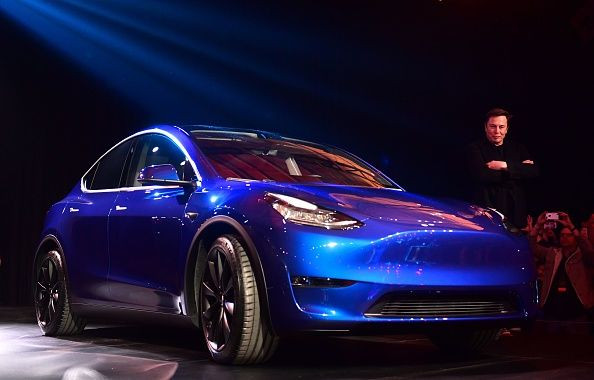The Model Y Could Save Tesla -- Or Destroy It

At first glance, Tesla (NASDAQ:TSLA) might seem to be on a roll. The electric vehicle pioneer posted a huge jump in deliveries last year, as production of its Model 3 sedan ramped up. Yet there have been growing signs of trouble at Tesla in the past few months. Most significantly, the Model 3 order backlog appears to be shrinking quickly, as evidenced by a drop in wait times for new orders and the recent introduction of the long-awaited $35,000 base model.
Against that backdrop, Tesla unveiled its next new model last week: the Model Y crossover. The Model Y will be Tesla's first foray into the compact/midsize crossover space, the hottest segment in the auto market. Thus, the vehicle could become extremely popular. However, it won't be available for at least a year and a half -- and now that car buyers know it's coming, Tesla could struggle to sell the vehicles it is building today.
The Model Y could be quite popular
Tesla CEO Elon Musk expects the Model Y to be the company's best-selling vehicle. Most analysts agree. In recent years, sales of sedans and hatchbacks have plunged in the U.S. and most of the world, as more car buyers have opted for the greater comfort and cargo space offered by crossovers and SUVs.
Thus far, Tesla's results don't fully fit this trend. In recent quarters, global deliveries of Tesla's Model S sedan and Model X SUV have been roughly equal.
That said, the Model S is extremely large. It even has optional rear-facing seats suitable for two children, nominally allowing it to seat seven people. By contrast, buyers who are comparing the Model Y to the smaller Model 3 sedan may opt for the crossover in far greater numbers, to take advantage of its extra space. That creates a potentially serious near-term problem for Tesla.
Will Model 3 sales hold up?
The Model Y will have a starting price of $39,000, just $4,000 more than the Model 3. And while Model 3 prices have been a moving target recently, it appears that upgraded versions of the Model Y will cost about 10% more than comparable versions of the Model 3.
That's a modest premium for a vehicle that has at least 50% more cargo space -- and can seat seven in a pinch, for buyers who pay an extra $3,000 for a third row. This raises the question of whether the Model Y will cannibalize demand for the Model 3.
Musk doesn't seem to think so. On Tesla's fourth-quarter earnings call, he estimated that steady-state global demand for the Model 3 would be around 700,000 to 800,000 units a year in a strong economy. With Tesla only expecting to build around 300,000 Model 3s this year, Musk's comments imply that capacity -- not demand -- would be the main constraint on sales, at least until Tesla's new factory in China gets up and running.
That said, Musk's confidence doesn't seem to be founded on actual order activity. During the earnings call, he mentioned that January and February tend to be slow months for auto sales. He also noted that the phase-out schedule for federal electric vehicle tax credits pulled some demand forward into late 2018. Thus, Musk expected Model 3 sales to rebound around now.
The Model Y announcement could cause many would-be Model 3 buyers to reconsider which Tesla is right for them. In the short term, the continuing availability of a $3,750 federal tax credit (through June) may bolster demand in the U.S. But based on the apparent slowdown in Model 3 orders in recent months, Tesla's current Model 3 production rate appears to be unsustainable.
Navigating perilous waters
Tesla ended 2018 with $3.7 billion of unrestricted cash. However, the company expected to burn cash in the first quarter, due to the timing and mix of deliveries. Furthermore, it recently repaid $920 million of convertible notes with cash.
Thus, Tesla's cash cushion has shrunk significantly since the beginning of 2019. Management hasn't been worried because it has been confident that Tesla would produce positive free cash flow for the rest of the year. But between the federal tax credit falling by 50% again at midyear, the introduction of the low-margin $35,000 Model 3, and a potential need to offset slumping demand with price cuts, incentives, or production cutbacks, Tesla is likely to continue burning cash beyond this quarter.
If the Model Y launch creates a significant air pocket in Model 3 demand, Tesla could face a cash crunch. Depending on how much cash it ends up burning, the company could have trouble raising capital if it proves necessary. That could decimate Tesla stock -- even if the Model Y ultimately becomes a big success.
Furthermore, a slowdown in demand this year could erode Tesla's brand halo. In the long run, that may be an even bigger threat to the company. A ton of competition is coming to the electric vehicle market, particularly in the crossover segment. If Tesla loses its cachet over the next year and a half due to falling sales, even the coming of the Model Y may not be enough to save it.
This article originally appeared in The Motley Fool.
Adam Levine-Weinberg has no position in any of the stocks mentioned. The Motley Fool owns shares of and recommends Tesla. The Motley Fool has a disclosure policy.




















